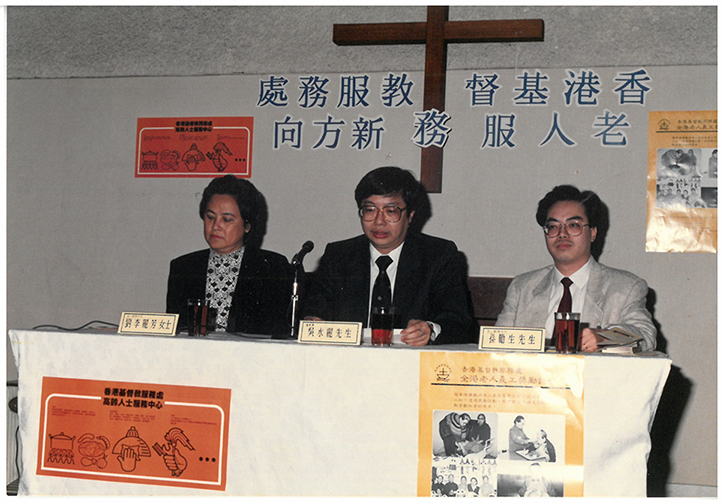The life cycle of the services symbolises the organisation's vitality
In a steamy afternoon in the 1960s, a group of sweaty primary school students passed by Tsui Ping Road, Kwun Tong. Tired of playing, they sat in the doorway of the Kwun Tong Vocational Training Centre (KTVTC), which had just been established at the time. One of them was Mr Suen Lai Sang, who became the Director of HKCS later in time.
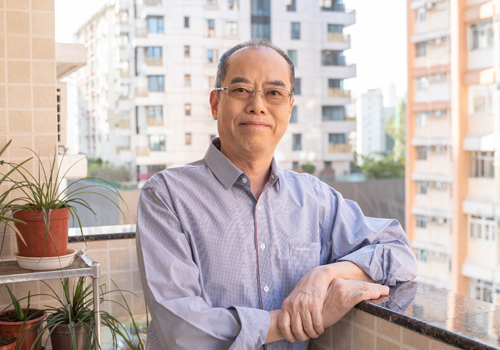
Mr Suen Lai Sang, MH Former Director (2011-2018)
KTVTC has a unique tie with Mr Suen Lai Sang (hereinafter referred to as Mr Suen). The building was constructed in 1965, and as a child he would see it every day after school. "After graduating in the early 1980s, I joined HKCS and oversaw the services in the temporary housing areas. I never thought that the place where I worked at that time was KTVTC nor that I would become a school superintendent later. The last thing I expected was that I ended its service there by myself in 2013". Mr Suen recalled slowly. Although it has become a fact in history, he still lingered on the memories shown in his expression. Having said that, he also expressed his positivity: "Social services are like this. It has its birth and an end. There is an endless stream of life. We have to rely on this vitality and creativity to provide the best suitable service to the public".
The comprehensively thought-out services
KTVTC was run by the Lutheran World Service, Hong Kong, one of the former organisations of HKCS, to provide pre-employment and vocational training for young people in the 1960s. As a voluntary organisation, why did they also run schools in addition to providing social services? Mr Suen explained, "At that time, foreign voluntary organisations were not subsidised nor had a predetermined scope of services like how we do now. Most of them were managed by the church. Since there was no government funding nor subsidisation request, they were inclined to provide services to the society autonomously in a self-initiated way". The compulsory education was not yet popularised in the 1960s, so that KTVTC came into establishment to meet to rising needs of skill development programmes of the young people.
Since there was no rigid framework in the establishment, the voluntary agencies could be more holistic in conceiving and incubating their services. He also offered an example: "In addition to vocational training, we also launched a nursery school at that time. Imagine when people find a job, who will take care of the children at home? The nursery school established could therefore meet the needs of the public arose in the society".
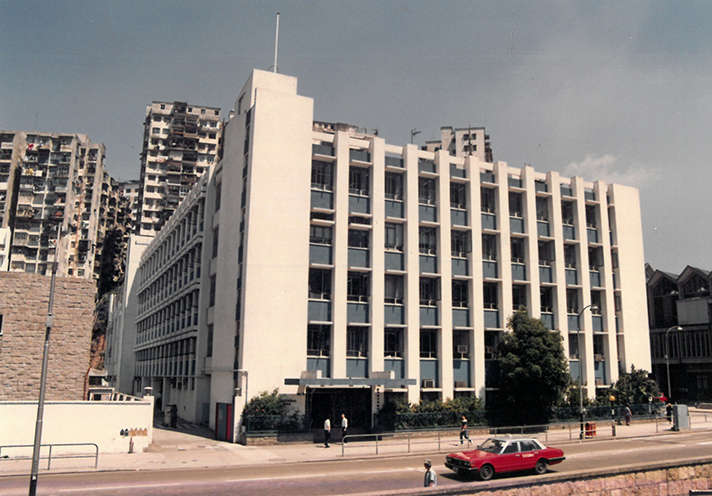 Kwun Tong Vocational Training Centre (KTVTC) in the 1980s
Kwun Tong Vocational Training Centre (KTVTC) in the 1980s
The result of a changing era
Along with the closure of KTVTC, Mr Suen said, "Emotionally speaking, I was very saddened by it. However, looking at it on a wider perspective, it was the result of the changing era." There was always an urging need to establish a vocational training centre or a nursery school, "We must observe the needs of the society and the social services must be appropriate and grounded to those needs. Just like KTVTC, more and more classes augmented because of the needs at the time".
Due to the changes in the generations, the number of students declined. In 2010, the government proposed a voluntary plan of Voluntary Optimisation of Class Structure Scheme (commonly known as class reduction) to relieve the pressure of "killing" schools. "Even Form-Six grades in secondary schools and tertiary education institutes began to cut classes, KTVTC was not alone in facing the problem of under-enrolment. It eventually ended its service".
Although the play had to end, he does not bury his feelings and forget about his attachment to KTVTC. Mr Suen occasionally comes across to people in the online groups saying, "I used to study here". Many years later he also learned that some of his secondary school classmates also went to KTVTC. He made an estimation, "Assuming that we served 2,000 day and evening students every year, we had served nearly 100,000 students in the past 48 years. Even being prudent with our calculation, we must have served 50,000 people throughout the years. In other words, KTVTC had helped a lot of people". In July 2013, KTVTC ended its 48-year service and accomplished its historical mission.
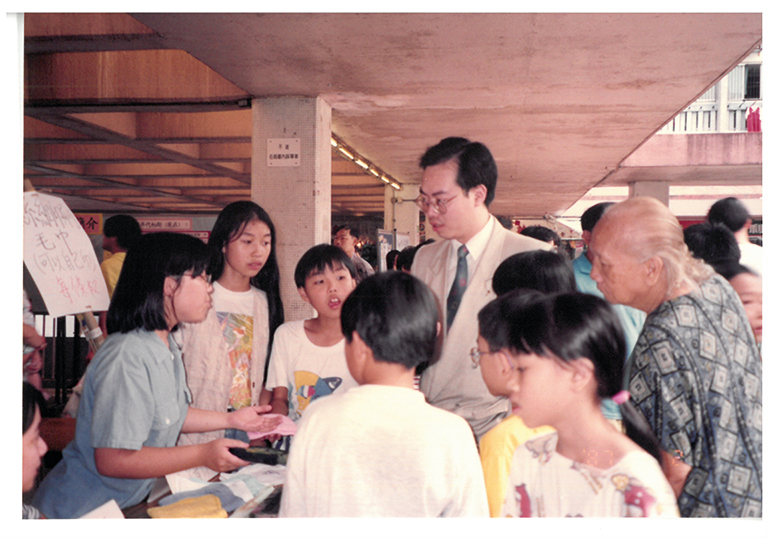
Mr Suen communicated with the young people in the 1990s.
The story of an old Chinese medicine doctor
Mr Suen is known for his passion for Chinese culture. Another service that evokes his memories is related to the mainland China—the new immigrant service that assisted people who came from mainland China to Hong Kong to adapt to local life in the 1980s. "In those days, the blood of Hong Kong people and mainland comrades was blended together. When they came to Hong Kong and encountered discrimination by the mainstream society, I naturally felt a sense of indignance."
Mr Suen recalled that some new immigrants were highend intellectuals, such as engineers and Chinese medicine practitioners, while they were unable to follow their professions after arriving in Hong Kong. They would inevitably feel aggrieved in life in such situation. "I was in charge of a project at the time, mainly initiating activities for young people. The most impressive participant was an older man in his 60s". The uncle surnamed Zhou, was a Chinese medicine practitioner. "He attended every event and studied Cantonese diligently". Two years after the programme, Uncle Zhou contacted Mr. Sun and said that he wanted to go to the church. Mr Suen introduced Uncle Zhou to the church and seized the chance to understand his stories more deeply. "He said to me, 'I've been observing you with a distance and I admire what you've done. From there I have become interested in Christianity unknowingly'. He then bought a Bible and read it dedicatedly by himself. The more he read, the more he realised he wanted to go to the church".
Mr Suen paused for a while, "He passed away. Although he had not been baptised, he adopted a Christian funeral ceremony with the consent of his family and pastors. I believe he has rested in the God's arms".
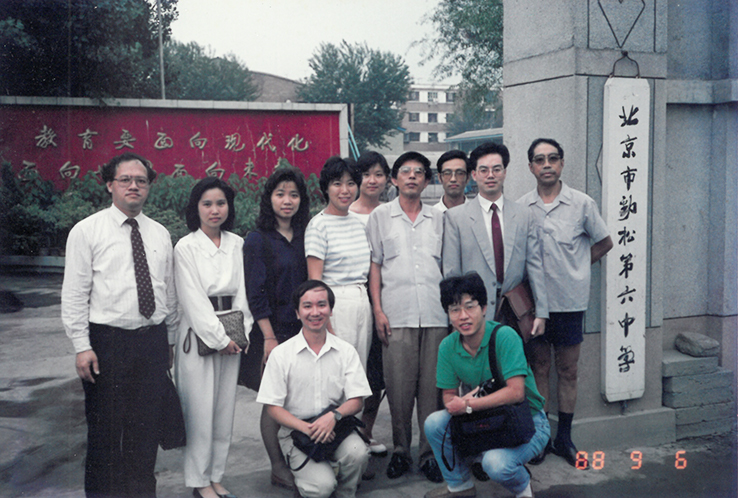 Mr Suen visited Beijing for an exchange on social service development in the 1980s.
Mr Suen visited Beijing for an exchange on social service development in the 1980s.
Giving the elderly a bright old age
Apart from KTVTC and the new immigrant services, Mr Suen is also dedicated to elderly services. "When a person is in the later age of life, he or she does not have to leave the world gloomily and sadly. Why can't we offer a better ending for them? This aspect of social services can help them". He listed a few services for the elderly, "Through the elderlies' sports day, volunteering and education programmes and so on, these activities we provide can brighten up their lives and help remove the negative labels around them. We later renamed the senior service as "Active Ageing" to bring out the positive meaning".
Speaking of services for the elderly, Mr Suen said that the care home hostel for the elderly promoted in the 1960s and 1970s played a symbolic role. "Wah Hong Hostel was the first experimental care home for the elderly in Hong Kong, followed by the one located in Kwai Fong. It was later moved to Tsing Yi, which is the Cheung Fat Home for the Elderly currently. The third one is Shun Lee Home for the Elderly". He said that living in Hong Kong, the environment is overcrowded. It is difficult for two or three generations to live together. Even if they can live together, the relationships can be tense due to frequent conflicts. "The care home service can solve these problems to a certain extent. In many cases, the relationship between the two generations has improved after the elderly was admitted to the care home." The negative stigmas around "the irresponsible generations who send their parents to the care home" need to be changed, and the elderly do not have to think that negatively.
Finally, Mr. Sun encouraged his co-workers to continue to work together to solve the challenges ahead. "HKCS is like a beehive, which is built by the queen bee and worker bees. This hexagonal hive can withstand a lot of pressure". May HKCS be like a hive that can stay resilient to various challenges in a rapidly developing social environment and continue to provide various appropriate services to those in need.
